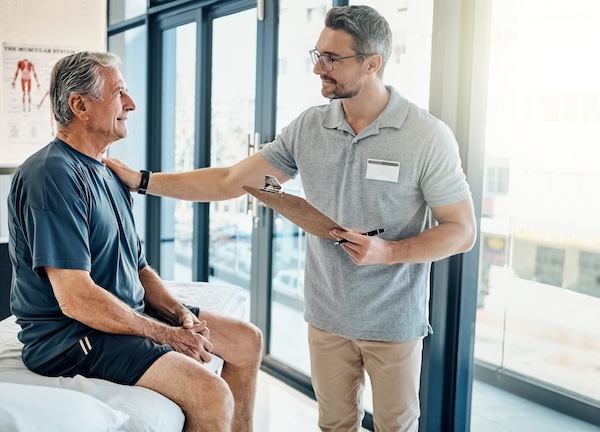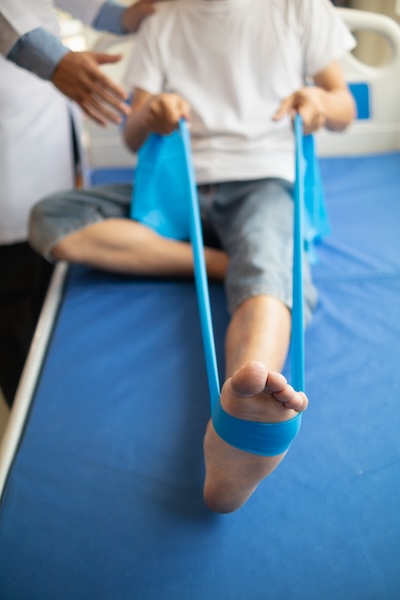Experiencing a car accident, sports injury, or workplace mishap can leave you dealing with pain, stiffness, or mobility limitations that affect your daily life. However, physical therapy offers a powerful, non-invasive solution for those in Dalton, GA.
At Georgia Spine & Orthopaedics, we specialize in helping patients recover through tailored physical therapy programs. Our goal is to enhance your recovery, reduce pain, and prevent future injuries by restoring your physical health and function.
Whether you’re recovering from an injury, managing chronic pain, or rehabilitating after surgery, physical therapy plays a key role in improving your quality of life. Our highly qualified physical therapists use advanced techniques to help you regain your strength, flexibility, and mobility so you can get back to doing the things you love.
What is Physical Therapy?
Physical therapy is a medical approach designed to help people recover from injuries, manage pain, and regain physical function through targeted, non-invasive treatments. It focuses on the body’s movement and functionality, using exercises, manual therapies, and other treatments to relieve pain, restore mobility, and strengthen muscles.
At Georgia Spine & Orthopaedics in Dalton, GA, physical therapy is customized for each patient based on their specific injury, condition, and goals. This patient-centered approach ensures the best possible recovery outcomes while preventing the need for surgery or medications in many cases.
When Should You Seek Physical Therapy?
Physical therapy is often recommended after an accident, injury, or the onset of chronic pain. If you experience any of the following symptoms, you may benefit from seeing a physical therapist in Dalton:
- Persistent Pain: If your pain continues beyond a few days and doesn’t respond to rest or over-the-counter medications, physical therapy can help identify and address the underlying cause.
- Decreased Mobility: Struggling to move a joint, limb, or experiencing stiffness that limits your daily activities, such as walking or dressing, could indicate the need for physical therapy.
- Muscle Weakness: After an injury, muscles can become weak, making it harder to perform daily tasks. Physical therapy helps restore muscle strength.
- Soft Tissue Injuries: Strains, sprains, or muscle tears that don’t heal on their own can be effectively treated with physical therapy techniques.
- Dizziness or Balance Issues: If you feel unsteady after an injury, physical therapy can improve balance, coordination, and strength to reduce your risk of falling.
Diagnostic Tools Used in Physical Therapy
To create an effective physical therapy plan, your therapist will conduct a comprehensive assessment that typically includes:
- Patient History: Gathering information about your injury, medical history, and current symptoms helps the therapist understand your condition.
- Physical Examination: The therapist will evaluate your range of motion, muscle strength, flexibility, and balance.
- Imaging Tests: X-rays, MRIs, or ultrasound imaging may be recommended to get a clearer picture of your injury if needed.
Based on this evaluation, your physical therapist will develop a personalized treatment plan that targets your specific injury and recovery goals.
Physical Therapy Techniques for Injury Treatment
At Georgia Spine & Orthopaedics, we utilize a variety of physical therapy techniques to help you manage pain, restore function, and regain strength. These include:
- Manual Therapy: Hands-on techniques such as joint mobilization, soft tissue massage, and Myofascial Release (MFR) to improve mobility and reduce pain.
- Therapeutic Exercises: Targeted exercises designed to strengthen muscles, improve flexibility, and restore range of motion.
- Dry Needling: A specialized technique where fine needles are inserted into trigger points to relieve muscle pain and improve movement.
- Cupping: A therapy that uses suction cups on the skin to increase blood flow and promote healing.
- Graston Technique: A form of manual therapy that uses stainless steel tools to break up scar tissue and improve mobility.
What to Expect During Physical Therapy Sessions
A typical physical therapy session lasts about 45-60 minutes and is scheduled 2-3 times a week. As you progress, the frequency of sessions may decrease. Here’s what you can expect:
- Review of Progress: Your therapist will assess any changes in your symptoms and make adjustments to your treatment plan as necessary.
- Manual Therapy: Hands-on techniques to reduce pain, improve flexibility, and enhance joint mobility.
- Personalized Exercise Program: Customized exercises designed to strengthen weakened muscles and improve range of motion. You may continue these exercises at home to maximize results.
- Patient Education: Guidance on managing pain, improving posture, and preventing future injuries through self-care.
Common Injuries Treated with Physical Therapy
Physical therapy is a highly effective treatment option for various types of injuries, including:
- Whiplash: Neck injuries from car accidents that cause pain, stiffness, and reduced mobility.
- Back and Spine Injuries: Physical therapy helps relieve back pain, improve core strength, and stabilize the spine after injury.
- Rotator Cuff Injuries: Shoulder injuries from accidents or overuse can be treated with strengthening exercises and improved joint stability.
- Fractures: After a bone heals, physical therapy is essential for restoring strength and mobility to the injured area.
- Joint Injuries: Issues with the knees, hips, or other joints can be addressed by improving range of motion, stability, and flexibility.
- Soft Tissue Injuries: Sprains, strains, and contusions benefit from physical therapy to reduce pain, inflammation, and promote healing.
How Physical Therapy Enhances Recovery
Physical therapy is an integral part of a full recovery process, helping patients return to their normal activities as quickly and safely as possible. Here’s how physical therapy can enhance your recovery:
- Pain Management: Physical therapy reduces chronic pain through targeted treatments like manual therapy and therapeutic exercises, minimizing the need for pain medication.
- Restored Mobility: Stretching exercises, joint mobilization, and strengthening programs help you regain full movement.
- Increased Strength and Stability: Weak muscles and joints are strengthened through specific exercises that enhance overall stability and reduce the risk of future injuries.
- Prevention of Future Injuries: By identifying and correcting underlying weaknesses, physical therapy helps prevent re-injury.
FAQs About Physical Therapy
What is physical therapy, and how does it help in recovery?
Physical therapy is a non-invasive healthcare discipline designed to restore function, enhance mobility, and reduce pain through a combination of exercises, manual therapy, and patient education. It plays a crucial role in the rehabilitation process for those recovering from injuries, surgeries, or managing chronic pain conditions.
By focusing on strengthening muscles, improving flexibility, and correcting imbalances, physical therapy helps to reduce discomfort, restore function, and prevent future injuries. The hands-on approach, along with guided exercises, ensures that patients achieve optimal health and regain their physical capabilities over time.
How soon should I start physical therapy after an injury?
It is generally recommended to begin physical therapy as soon as possible following an injury or surgery. Early intervention is key to preventing further complications, reducing inflammation, and minimizing scar tissue development.
Starting physical therapy early promotes faster healing by restoring mobility, enhancing strength, and reducing pain. Whether it’s a car accident, a sports injury, or a workplace incident, seeking physical therapy promptly can prevent long-term damage and promote a quicker recovery.
Can physical therapy prevent the need for surgery?
Yes, physical therapy can often prevent or delay the need for surgery in many cases. By focusing on improving joint function, reducing pain, and enhancing overall mobility, physical therapy helps manage injuries and chronic conditions non-invasively.
For conditions such as herniated discs, knee injuries, rotator cuff tears, or spinal issues, physical therapy may reduce symptoms to the point where surgery is unnecessary. Strengthening muscles around injured areas can provide the support needed for the body to heal itself naturally, reducing the risk of further damage or the need for surgical intervention.
What should I expect during a typical physical therapy session?
A typical physical therapy session at Georgia Spine & Orthopaedics in Dalton, GA lasts between 45 to 60 minutes. Here’s what you can expect:
- Progress Review: Your therapist will begin by discussing how you have felt since the last session and assess any changes in pain or mobility.
- Manual Therapy: Hands-on techniques such as joint mobilization, massage, and soft tissue manipulation will be performed to alleviate pain and restore mobility.
- Therapeutic Exercises: You will engage in targeted exercises designed to strengthen weakened muscles, improve flexibility, and enhance balance and coordination.
- Patient Education: The therapist will provide information on proper posture, pain management strategies, and exercises to continue at home to accelerate your recovery. Each session is tailored to the patient’s specific needs and adjusted as they progress in their recovery.
How long does it take to recover with physical therapy?
Recovery time through physical therapy varies depending on the type and severity of the injury or condition. For minor injuries, such as sprains or strains, noticeable improvement can occur within a few weeks of consistent therapy. For more severe injuries, such as fractures or post-surgical rehabilitation, recovery might take several months of regular sessions.
The frequency of visits, adherence to home exercise routines, and the patient’s overall health will influence the recovery timeline. Your physical therapist will set realistic goals and provide guidance on what to expect as you move through the treatment process.
Will insurance cover physical therapy in Dalton, GA?
Yes, most insurance plans cover physical therapy services, but the level of coverage can vary depending on your provider and specific plan. It’s essential to verify your benefits before starting therapy. Georgia Spine & Orthopaedics works with many insurance companies and can assist you in determining whether your physical therapy sessions are covered under your policy.
If you have questions about co-pays, deductibles, or coverage limits, our office staff is happy to help clarify the details to ensure you receive the treatment you need.
Is physical therapy only for injury recovery, or can it help with chronic conditions?
Physical therapy is not just for injury recovery but also highly effective for managing chronic conditions such as arthritis, fibromyalgia, and degenerative joint diseases. Chronic pain can severely limit your mobility and affect your quality of life.
Physical therapy focuses on improving the strength, flexibility, and endurance of muscles around the affected areas, which helps manage pain and enhance overall function. For people with long-term conditions, physical therapy can provide long-term relief and help prevent the need for medications or surgical interventions.
What types of injuries can physical therapy treat?
Physical therapy is versatile and can be used to treat a wide variety of injuries, including:
- Sports Injuries: Sprains, strains, tendonitis, and ligament tears.
- Car Accident Injuries: Whiplash, back pain, and joint injuries.
- Workplace Injuries: Repetitive stress injuries, fractures, and strains.
- Post-Surgical Rehabilitation: Helping restore function after surgeries such as joint replacements or ligament repairs.
- Chronic Conditions: Managing conditions like arthritis, scoliosis, and sciatica. Physical therapy is tailored to the individual’s specific condition, ensuring the most effective treatment for the injury or chronic issue.
Can physical therapy help improve posture?
Yes, physical therapy can significantly improve posture by identifying areas of weakness or imbalance in the body. Poor posture often results from tight muscles, weak core muscles, or improper body mechanics. A physical therapist will develop an exercise program to strengthen the muscles needed for better posture, such as the core and upper back muscles.
Improving posture not only reduces pain in areas like the neck and lower back but also helps prevent future injuries.
How does physical therapy prevent future injuries?
Physical therapy focuses on correcting underlying issues that may have contributed to your injury. This might include strengthening weak muscles, improving joint flexibility, or teaching proper movement techniques. By addressing these weaknesses, physical therapy not only helps you recover from your current injury but also prevents future injuries from occurring.
Your therapist will provide guidance on exercises and movements to incorporate into your daily routine, helping maintain long-term health and physical resilience.
What should I wear to a physical therapy session?
It’s best to wear loose, comfortable clothing to your physical therapy session—something that allows for a full range of motion. Athletic wear like sweatpants, leggings, and a T-shirt is ideal. Comfortable, supportive shoes such as sneakers are recommended, as many sessions involve movement-based exercises.
If your therapy focuses on a specific part of the body (e.g., the shoulder or knee), wearing clothing that allows easy access to that area is helpful.
Start Your Recovery with Physical Therapy in Dalton, GA
At Georgia Spine & Orthopaedics in Dalton, GA, we offer personalized physical therapy programs designed to help you recover quickly and effectively. Whether you’re dealing with pain from an accident or recovering from surgery, our expert therapists are here to support your recovery journey.
Contact us today at [Phone] to schedule an appointment and begin your path to better health and mobility.








